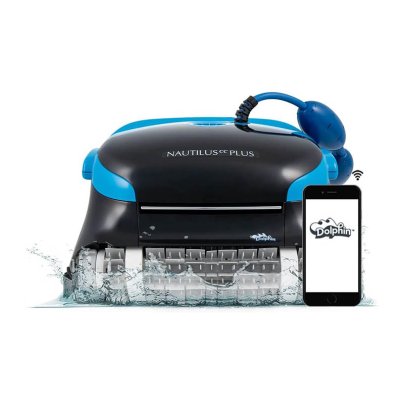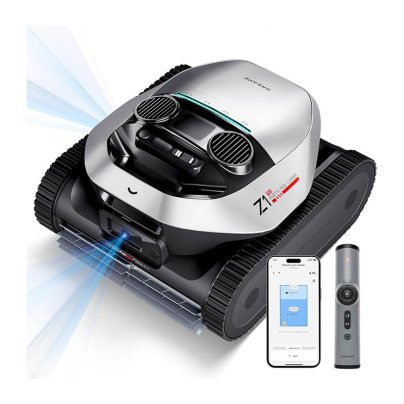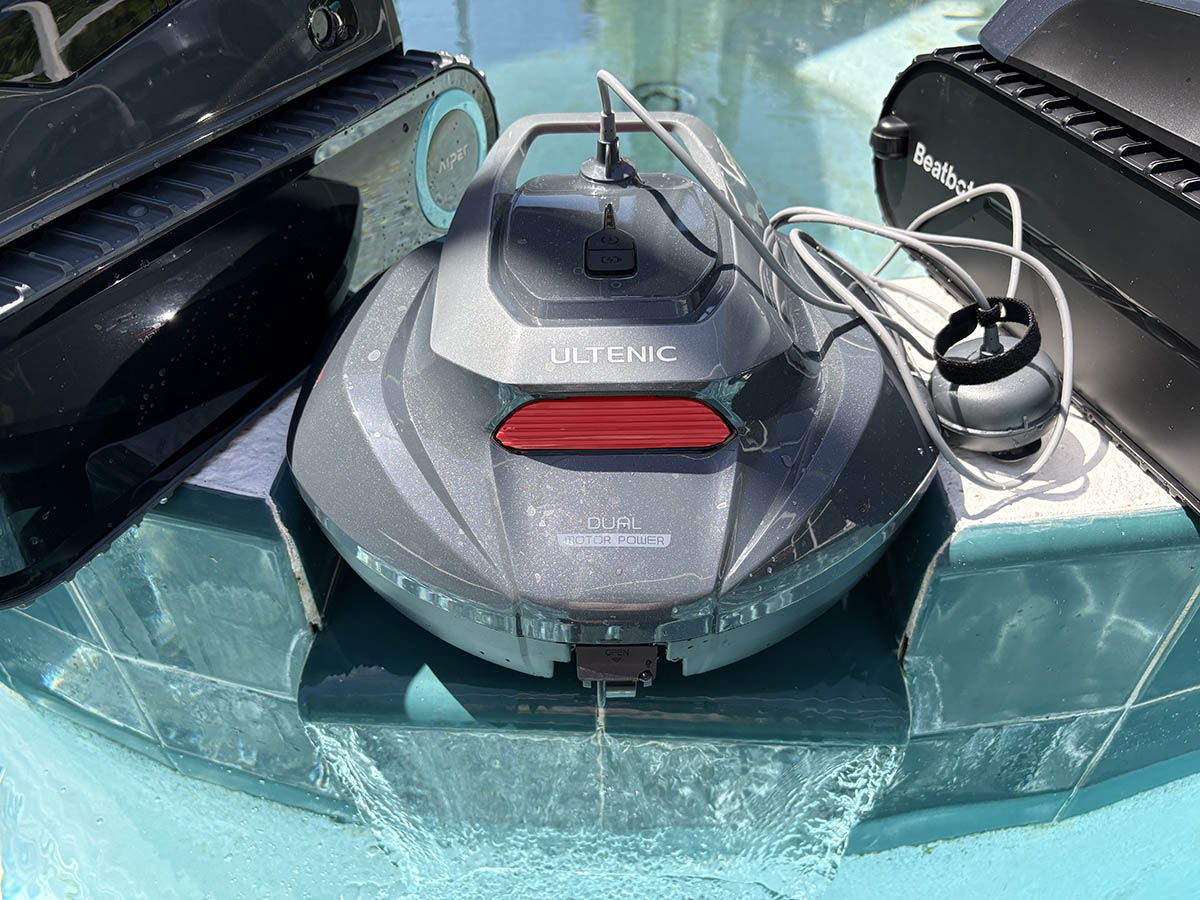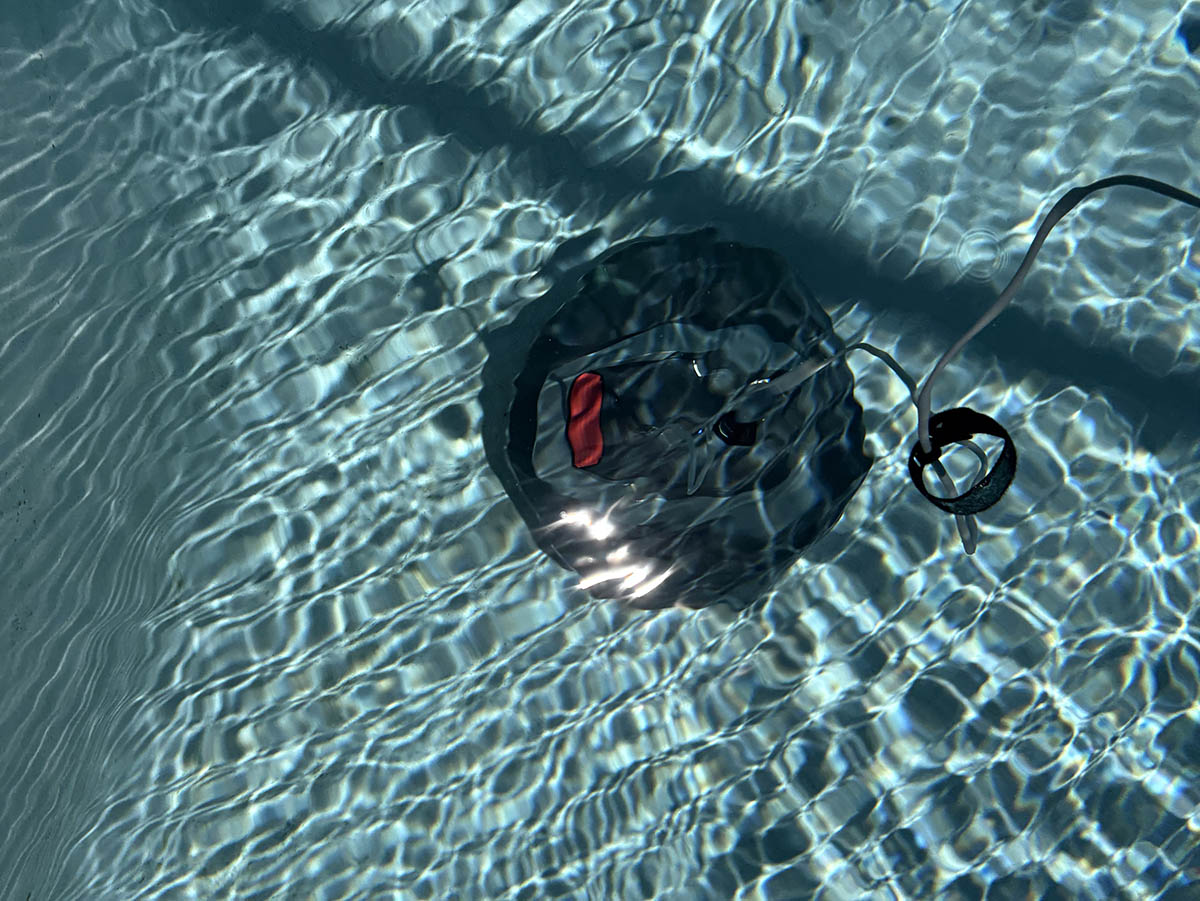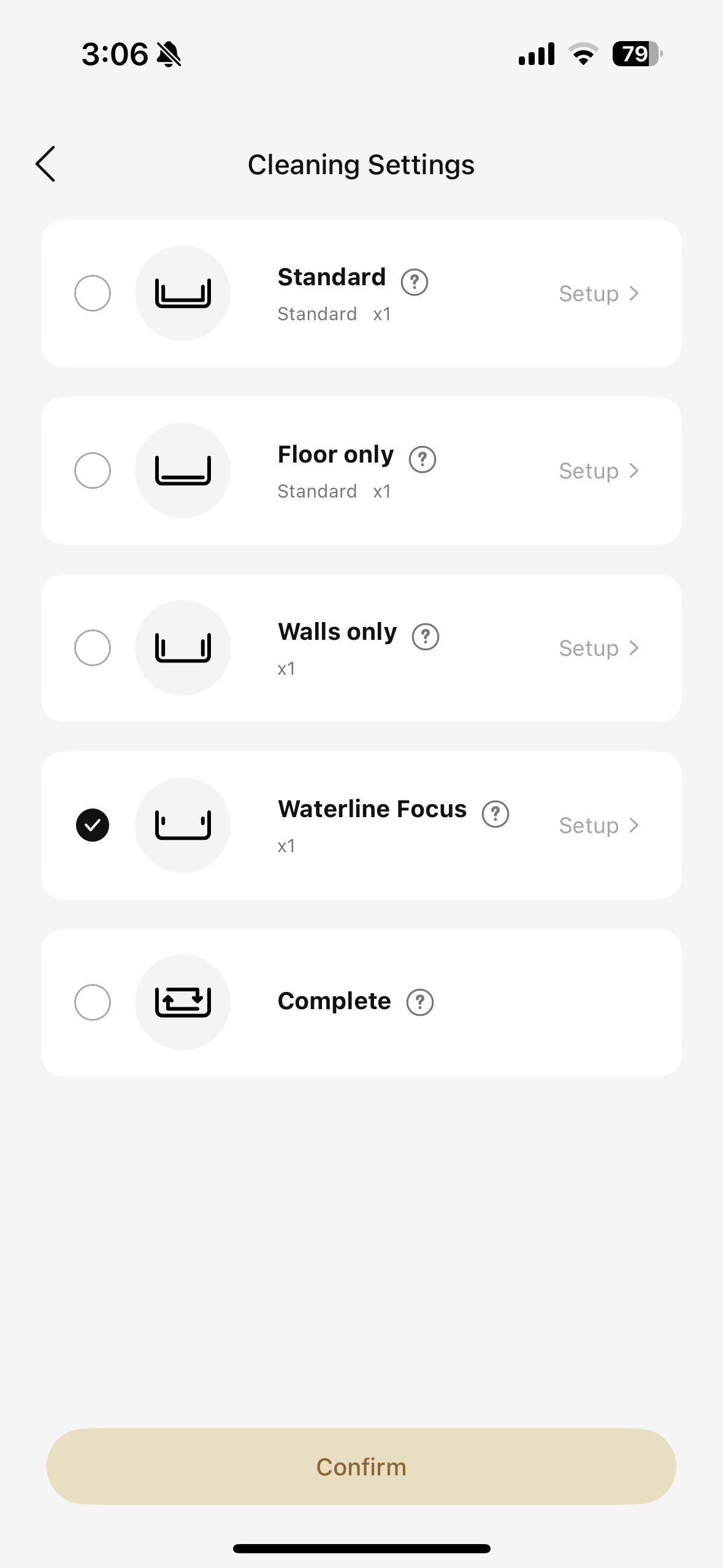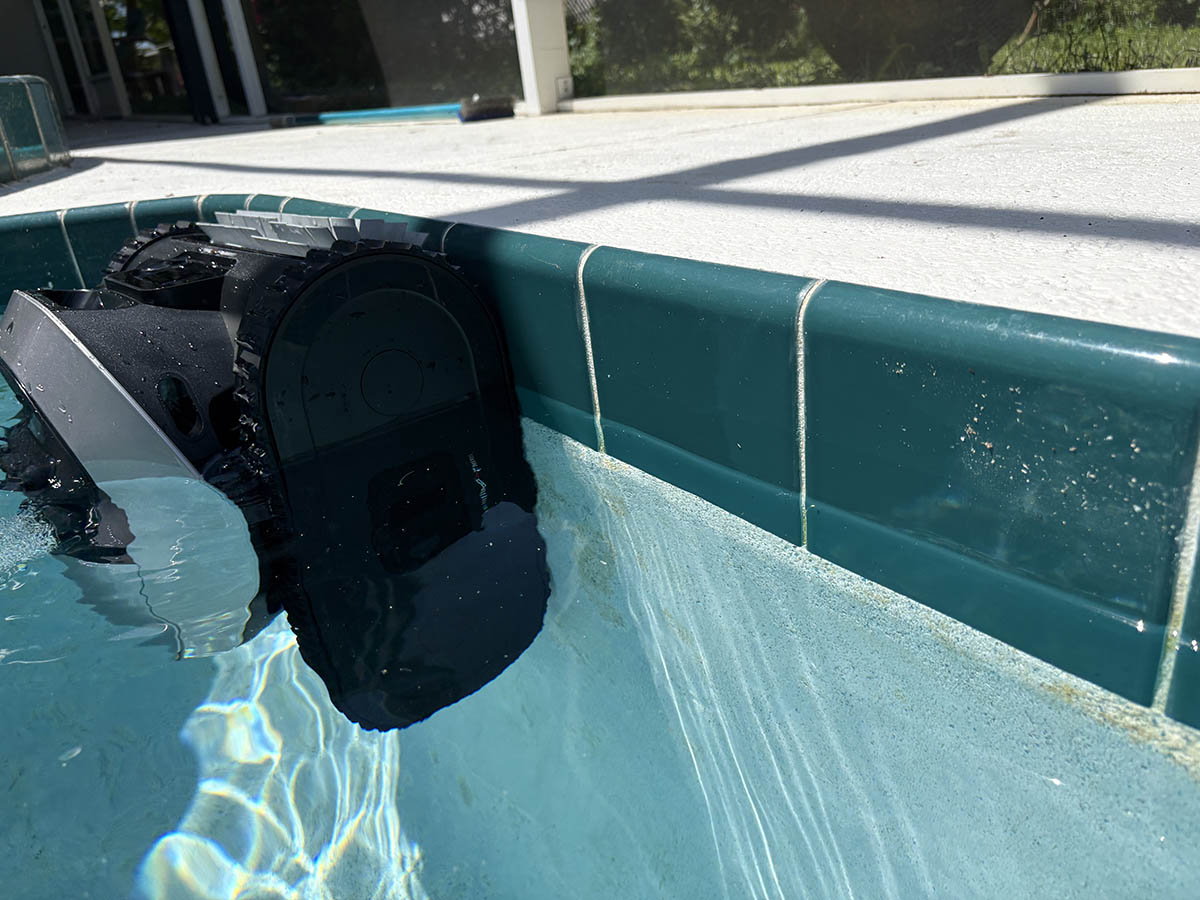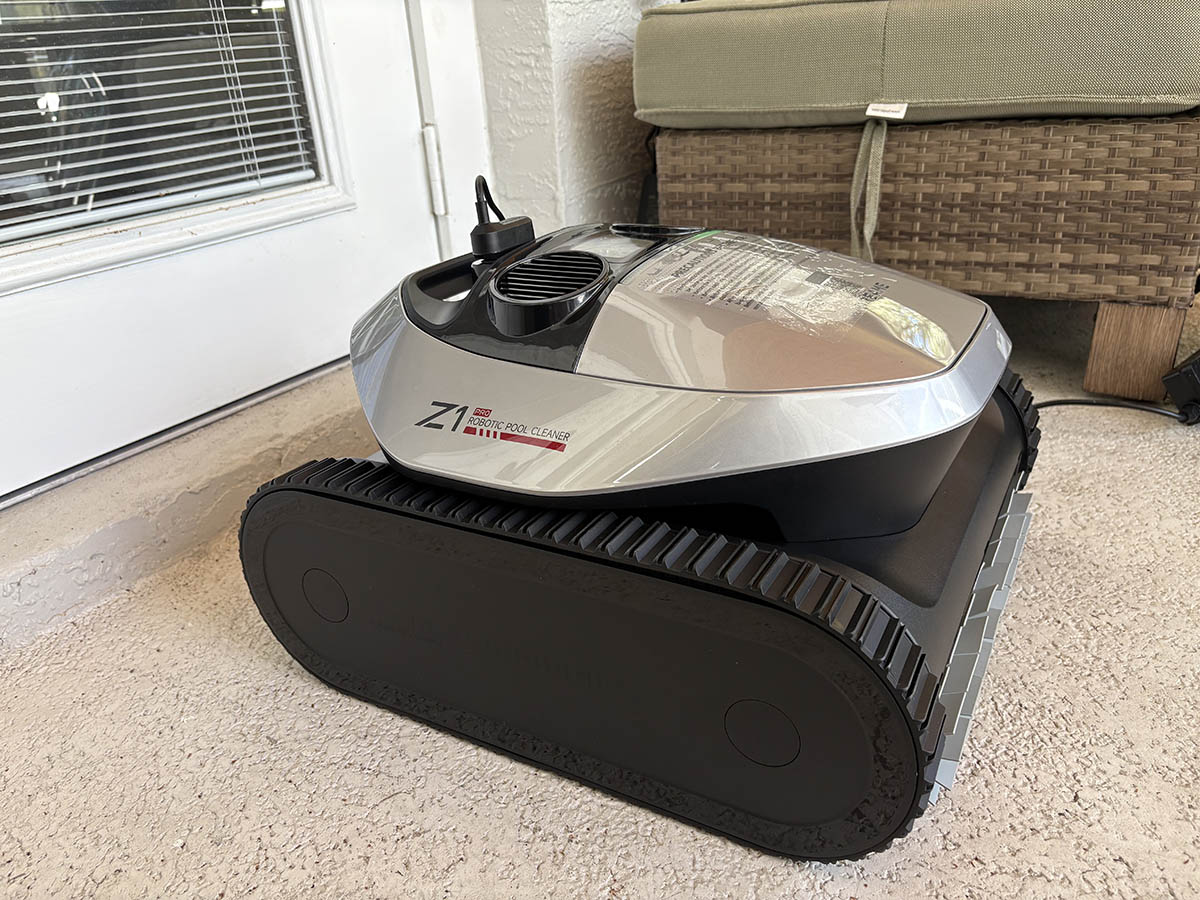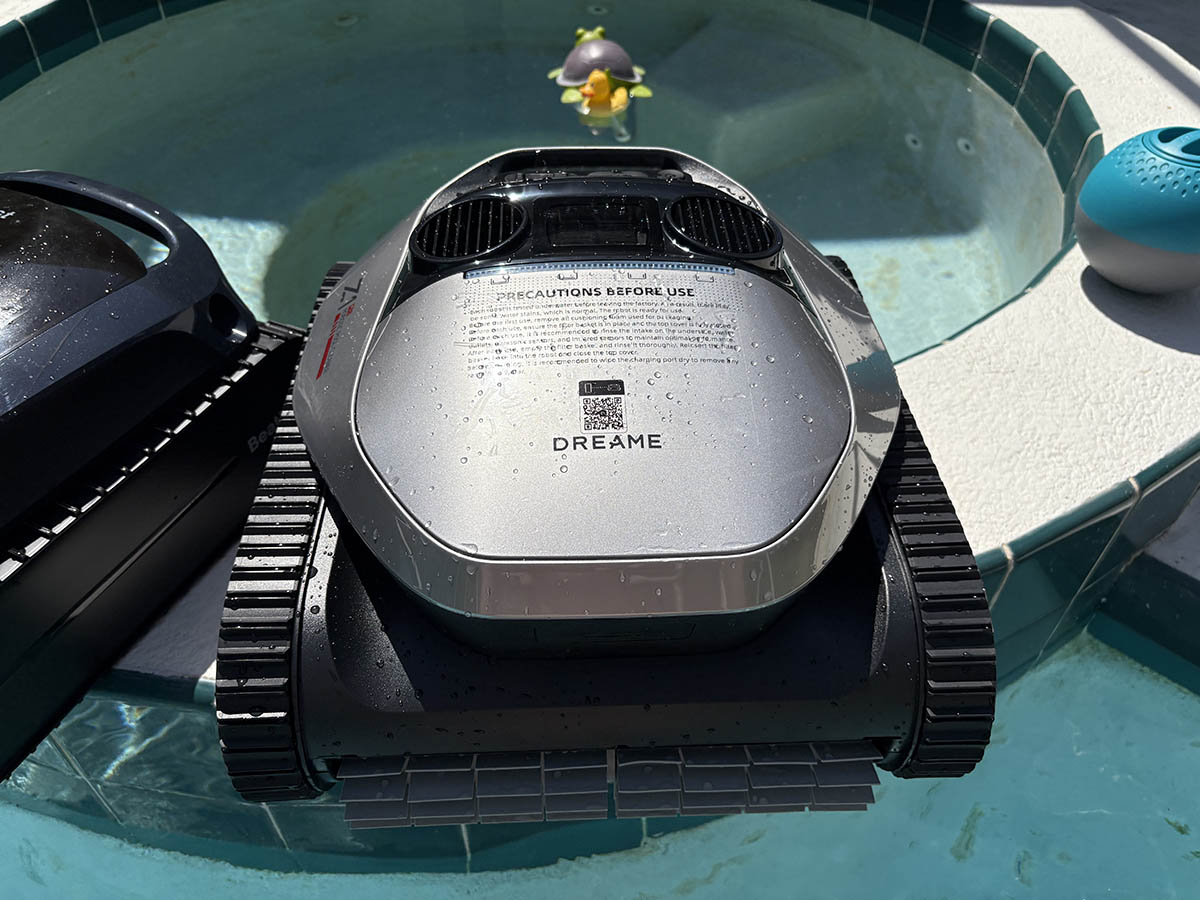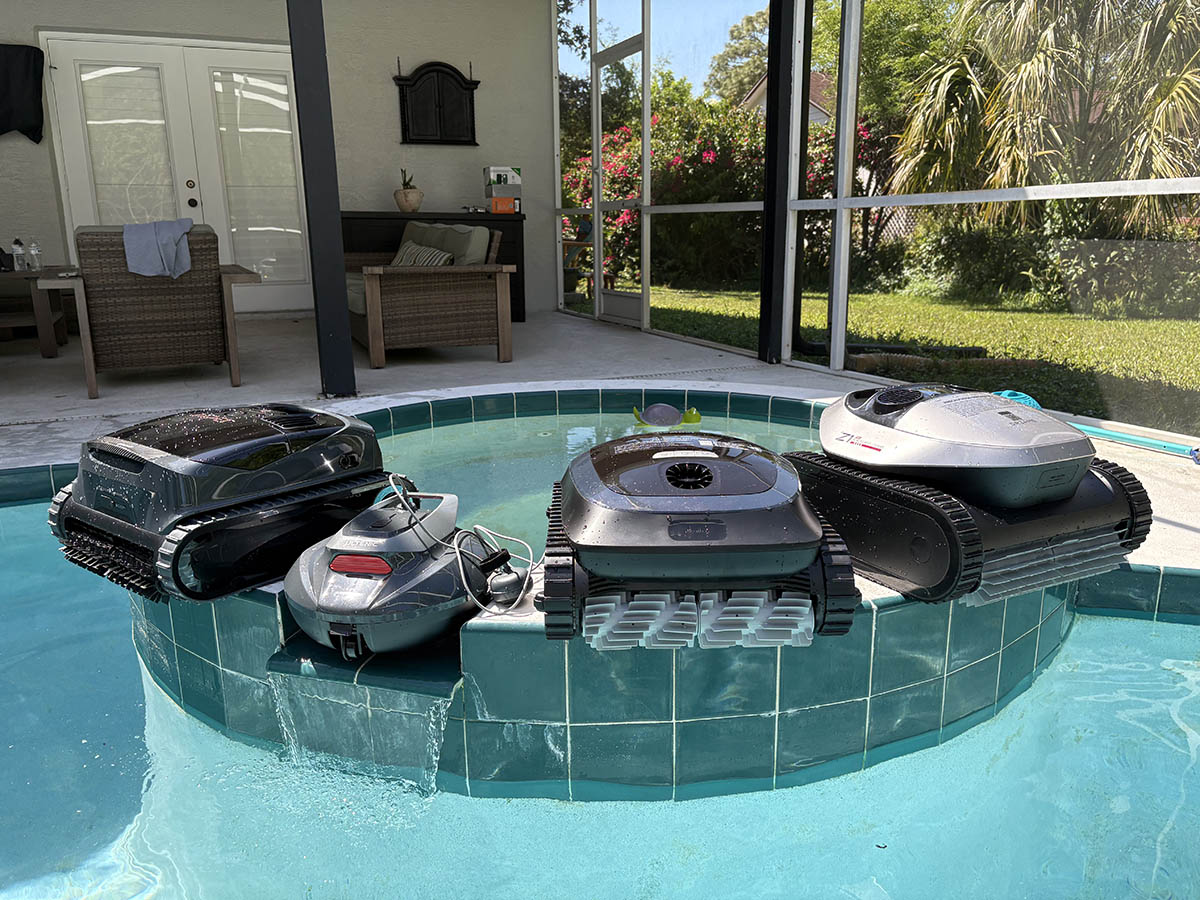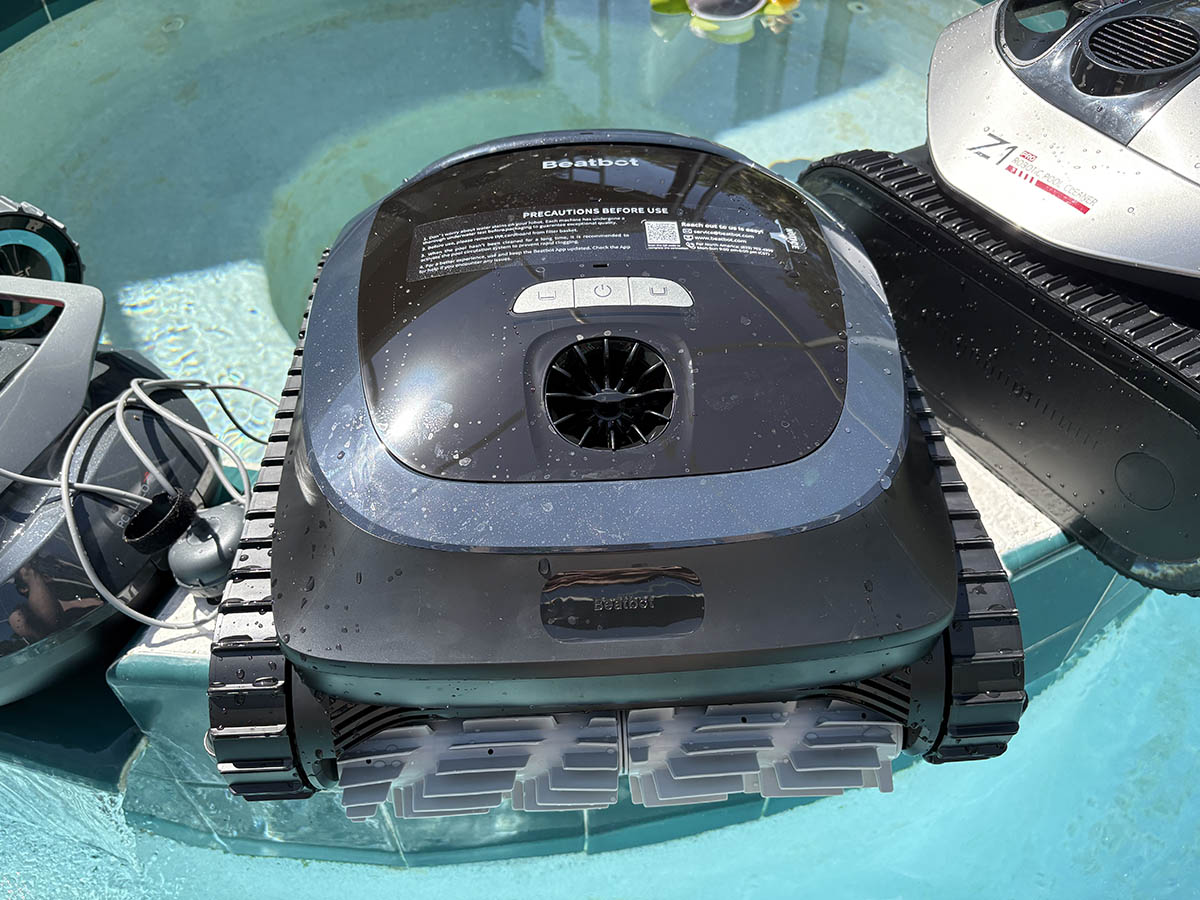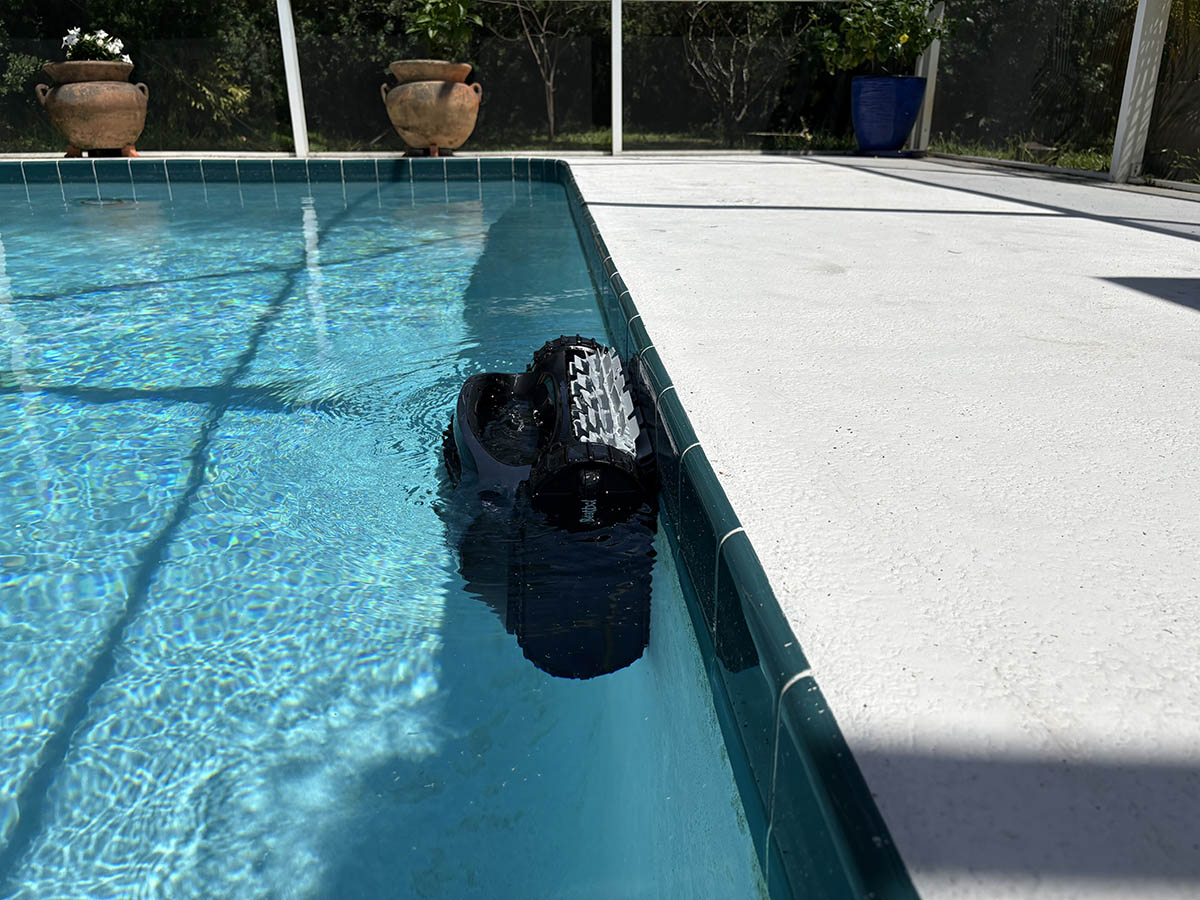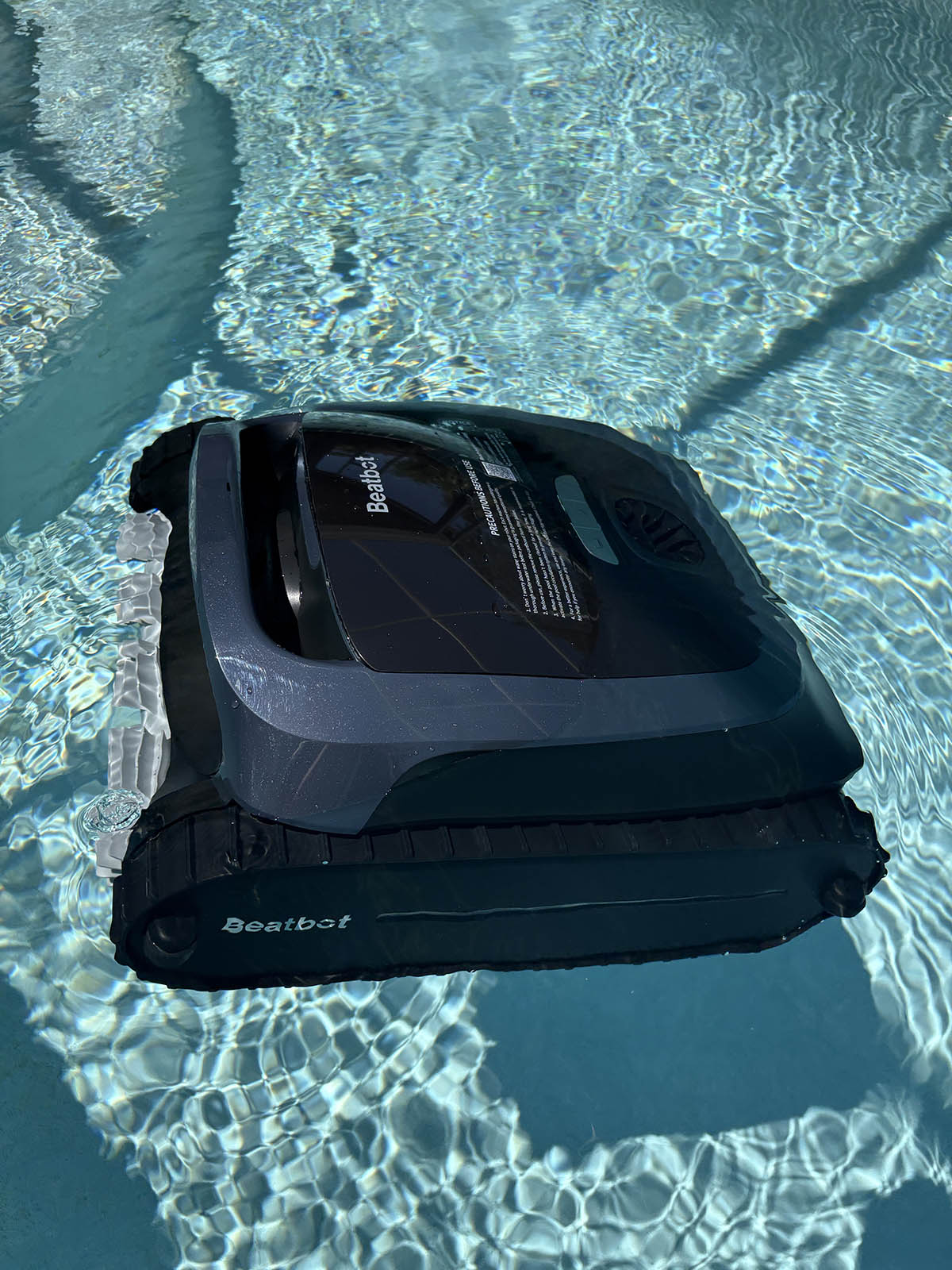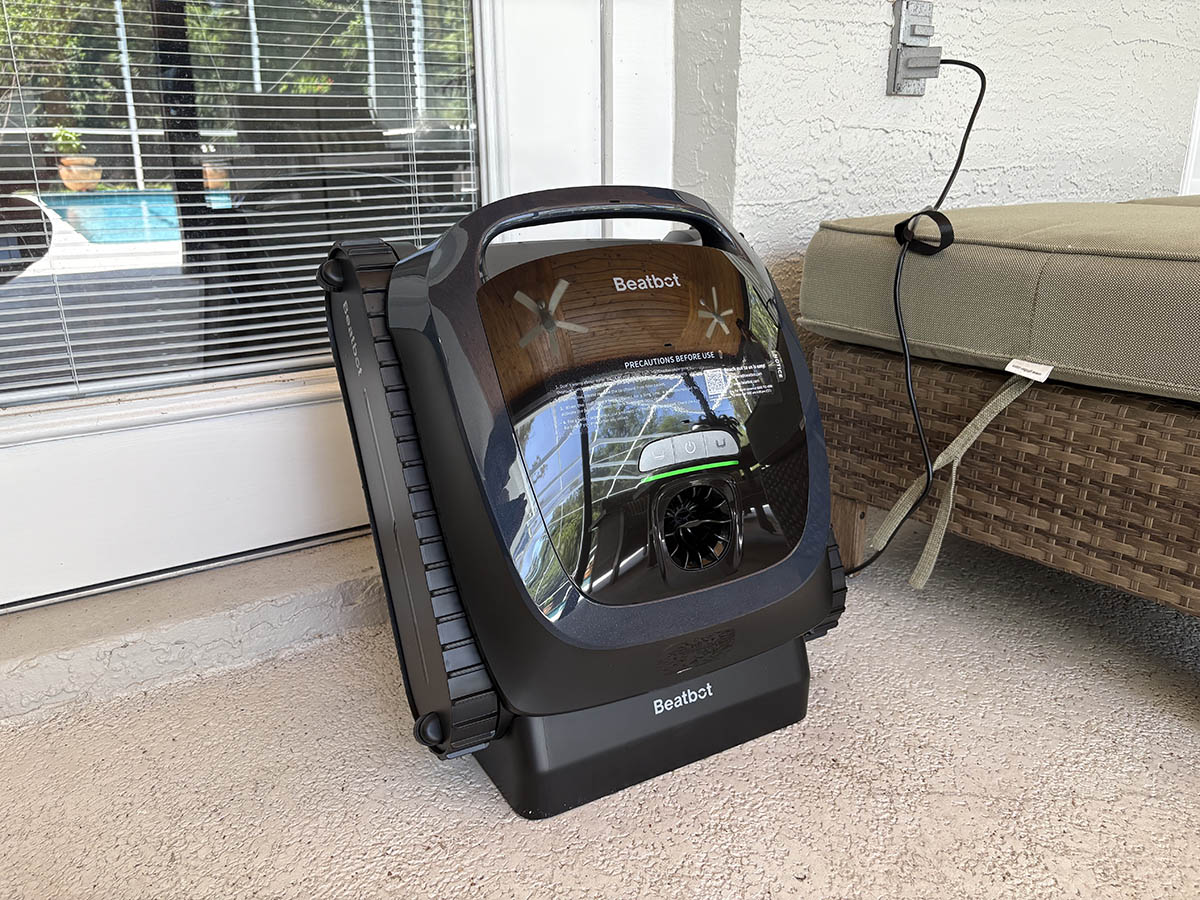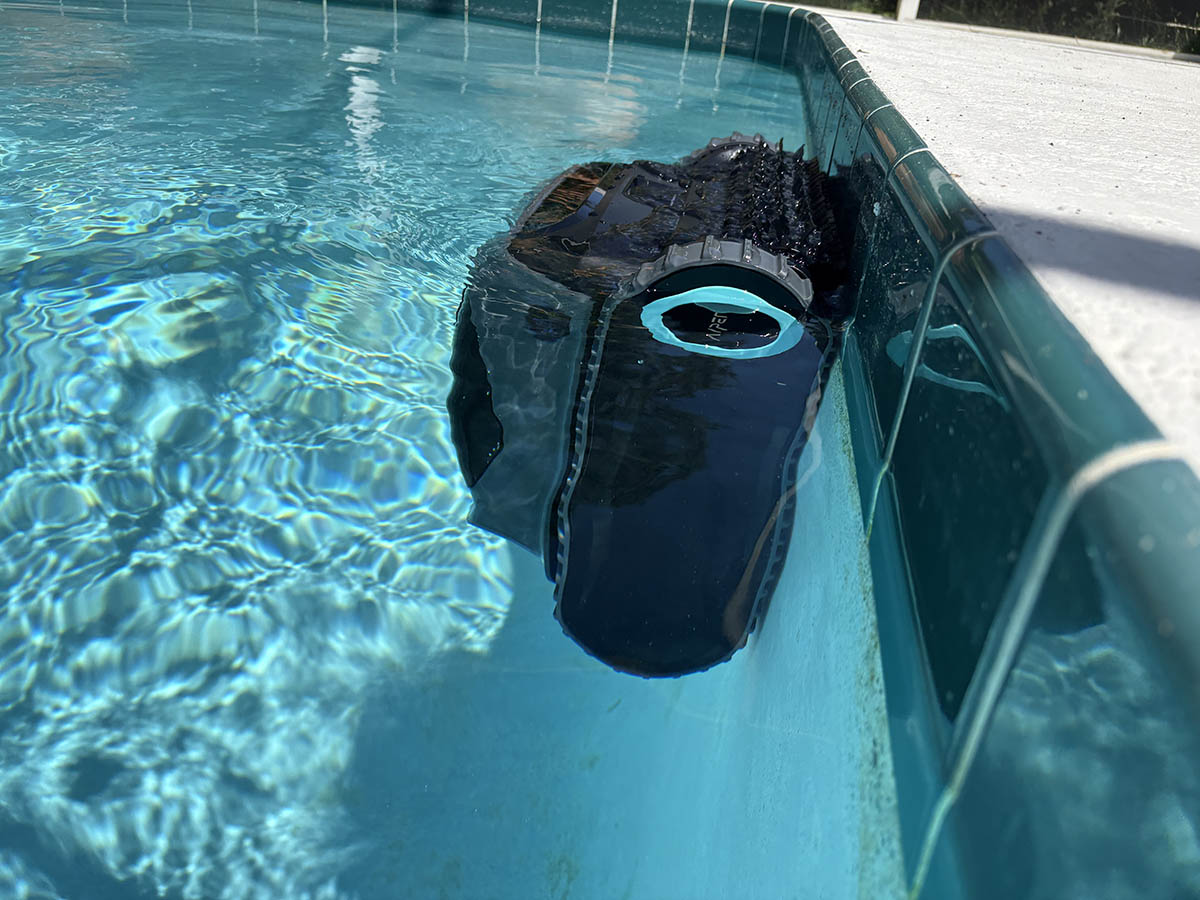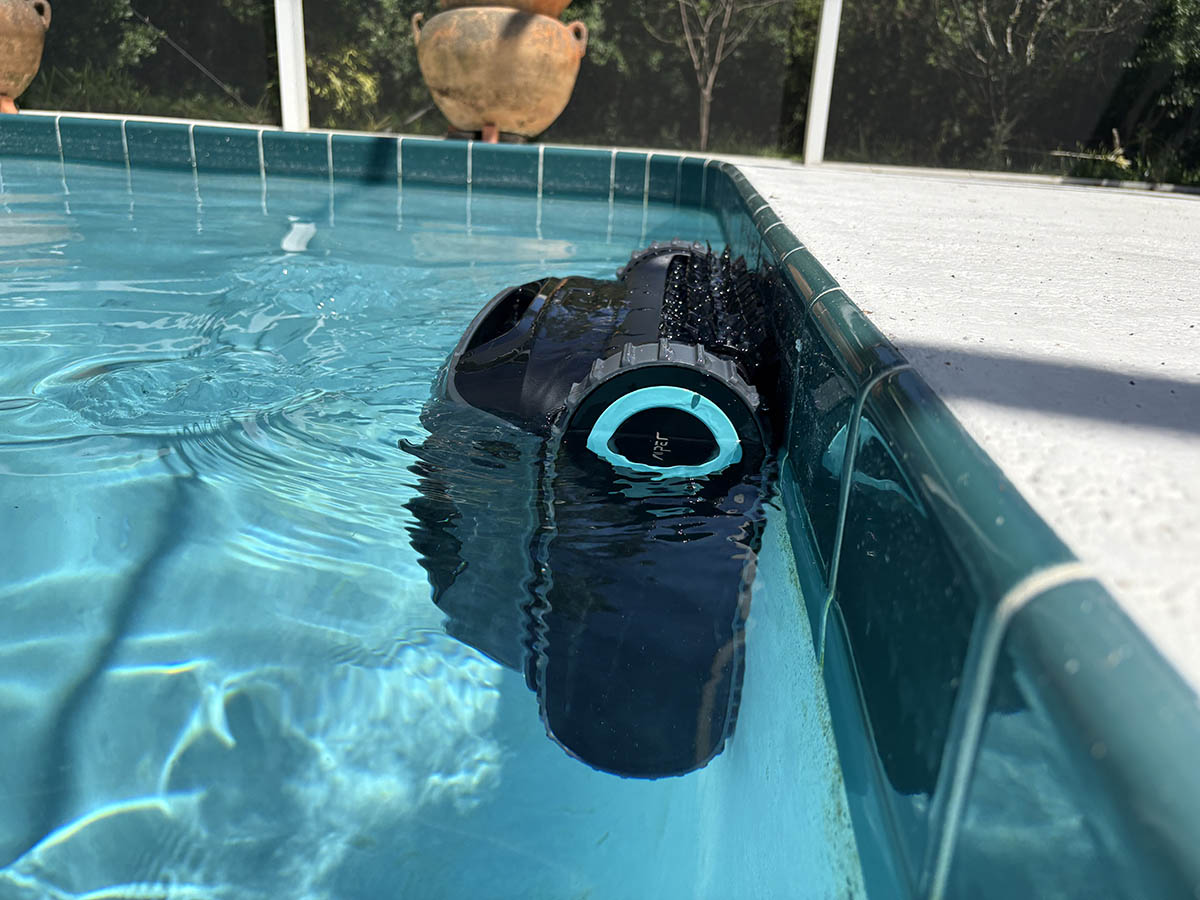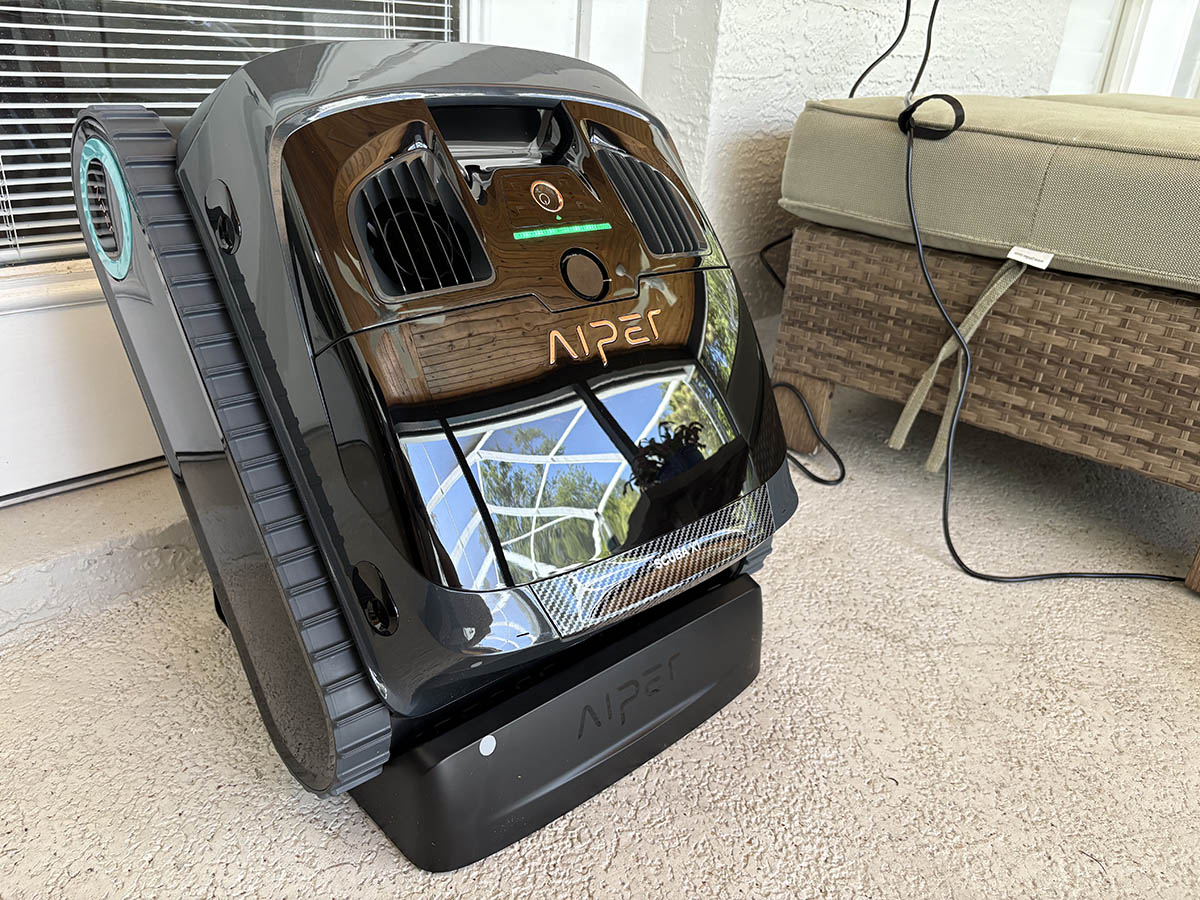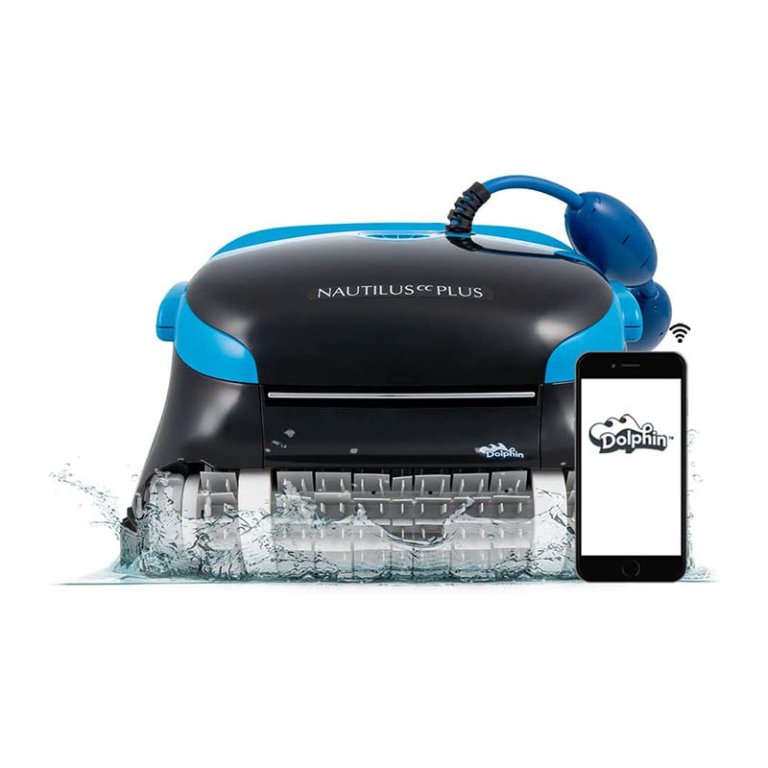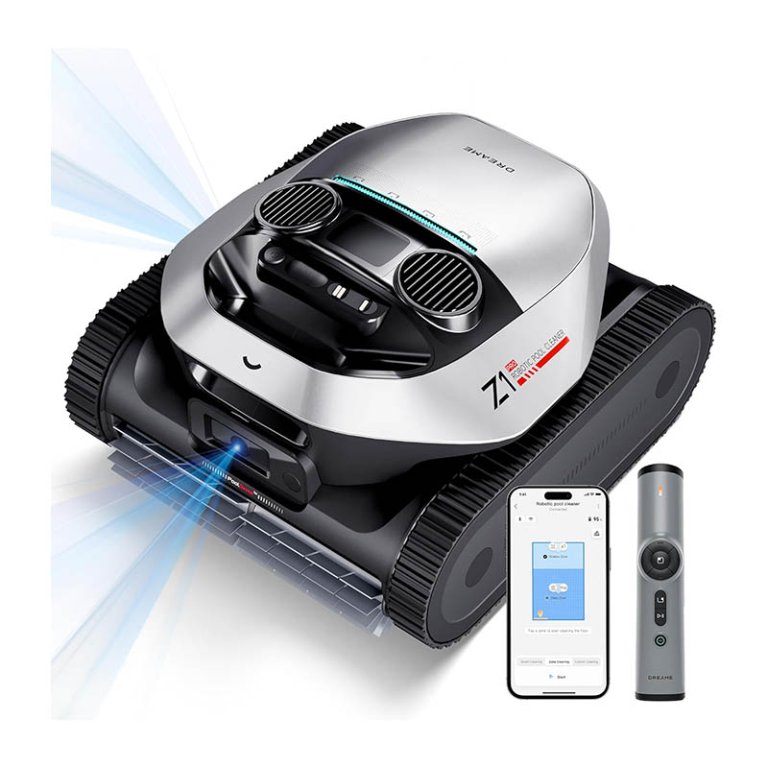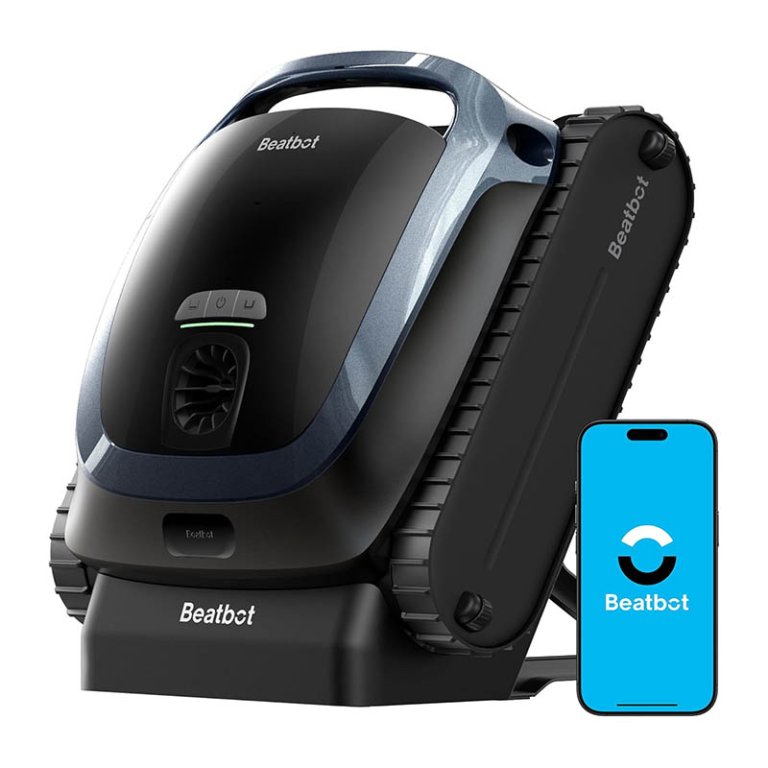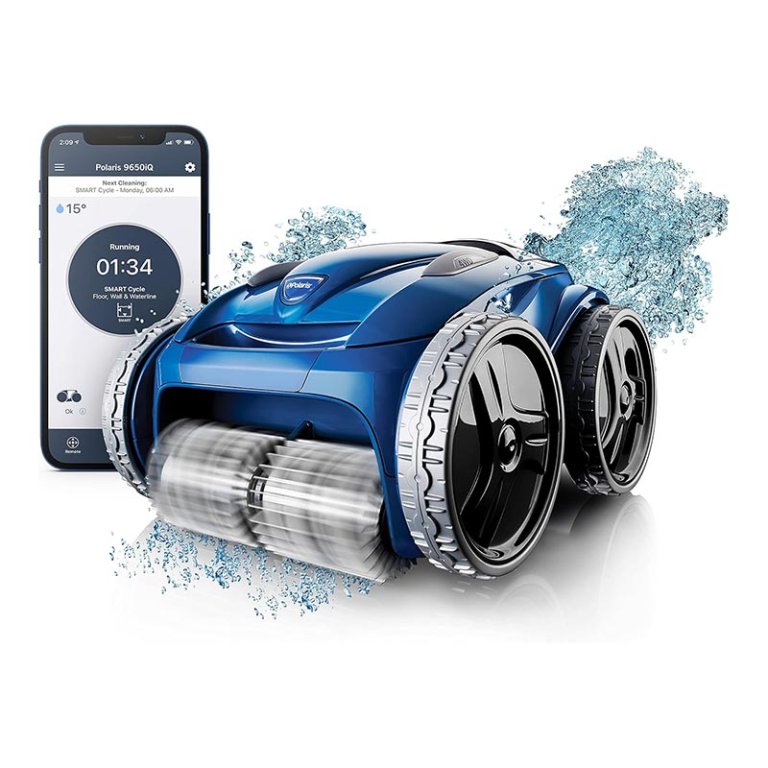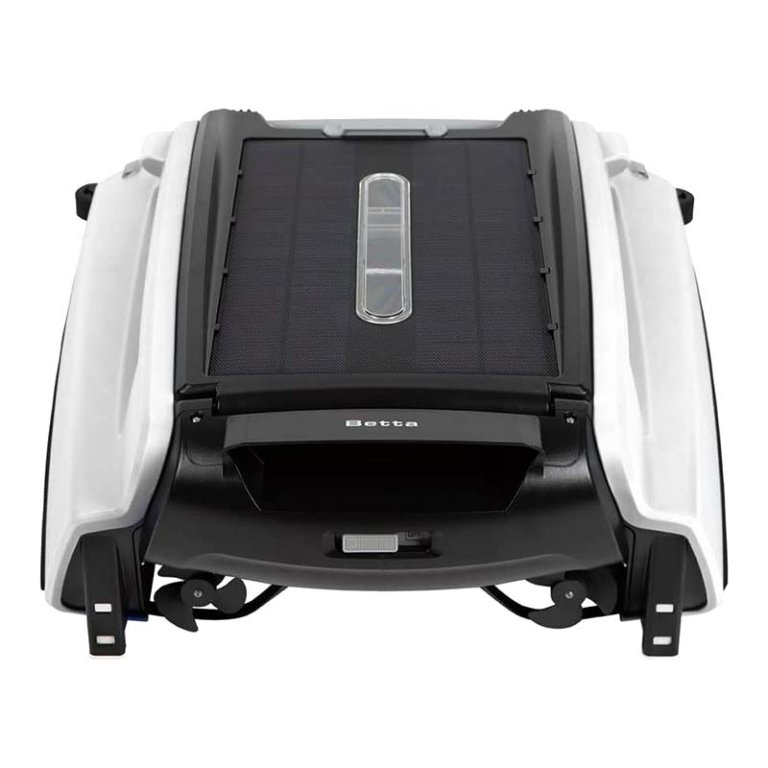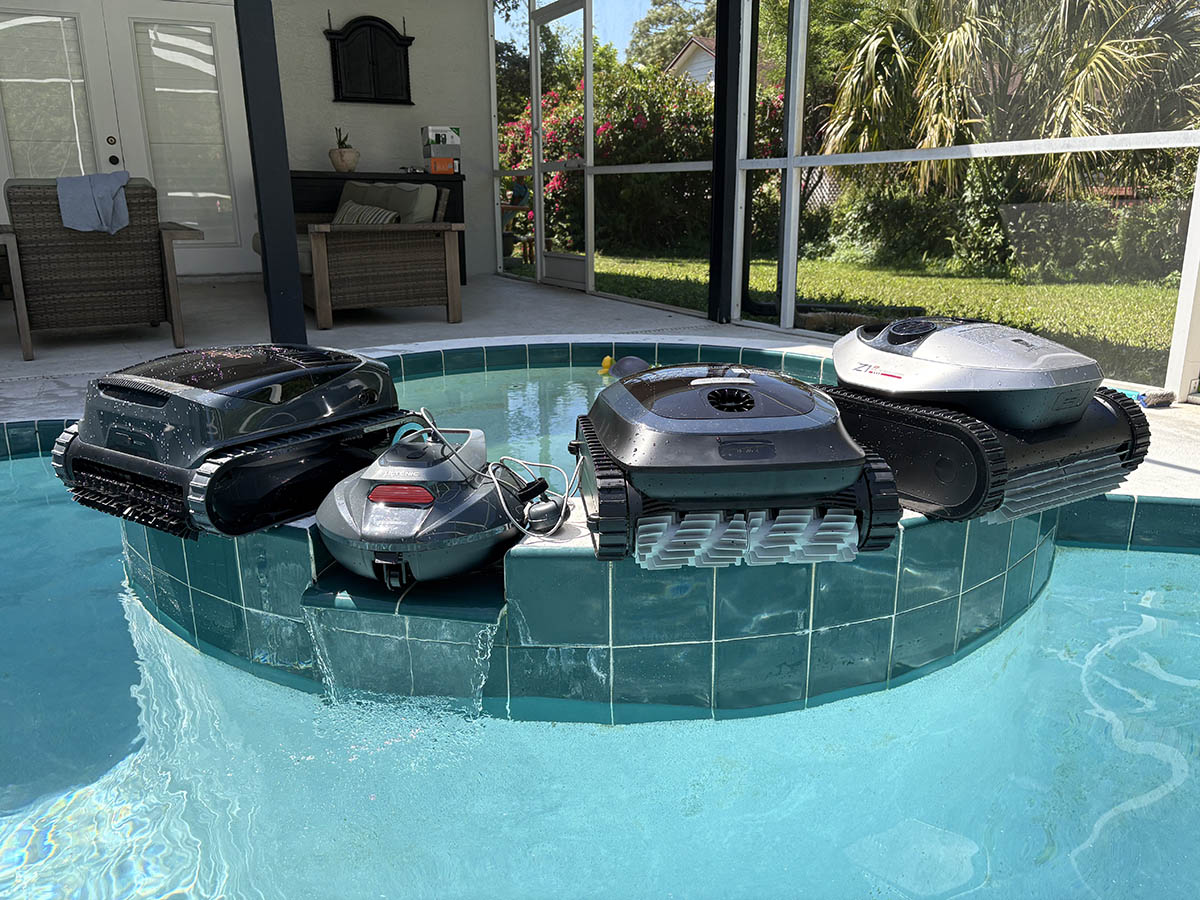
We may earn revenue from the products available on this page and participate in affiliate programs. Learn More ›
A robotic pool cleaner takes the hassle out of keeping a pool crystal clear. We tested nine top models in both above-ground and inground pools to see which could tackle dirt, leaves, and algae buildup with minimal effort. These automated devices function much like robotic vacuums for indoor carpeting, navigating the pool floor and even climbing walls, all while filtering debris and circulating water.
Routine pool maintenance doesn’t just improve clarity—it also helps the sanitizer work more efficiently and prevents algae from taking over. But not all robotic models perform equally well. After weeks of hands-on testing in both chlorine and saltwater systems, the model that impressed us most was the Dolphin Nautilus CC Plus Robotic Pool Cleaner. It’s easy to use, doesn’t get stuck, and handles large debris with an outstanding filtration system.
If you’re ready to upgrade your pool routine, we’ve rounded up the best robotic pool cleaners to suit a range of pool types, sizes, and budgets.
- BEST OVERALL: Dolphin Nautilus CC Plus Robotic Pool Cleaner
↓ Jump to Review - BEST BANG FOR THE BUCK: Ultenic Pooleco 10 series Robotic Pool Cleaner
↓ Jump to Review - UPGRADE PICK: Dreame Z1 Pro
↓ Jump to Review - BEST FILTRATION: Aiper Scuba X1
↓ Jump to Review - BEST ALL-IN-ONE: Beatbot AquaSense 2
↓ Jump to Review - BEST FOR ABOVE-GROUND: Dolphin Escape Robotic Pool Cleaner
↓ Jump to Review - BEST FOR INGROUND: Polaris 9650iQ Sport Robotic Pool Cleaner
↓ Jump to Review - BEST FOR SMALLER POOLS: Polaris P70 Robotic Pool Cleaner
↓ Jump to Review - BEST ROBOTIC SKIMMER: Betta SE Solar-Powered Smart Robotic Pool Skimmer
↓ Jump to Review
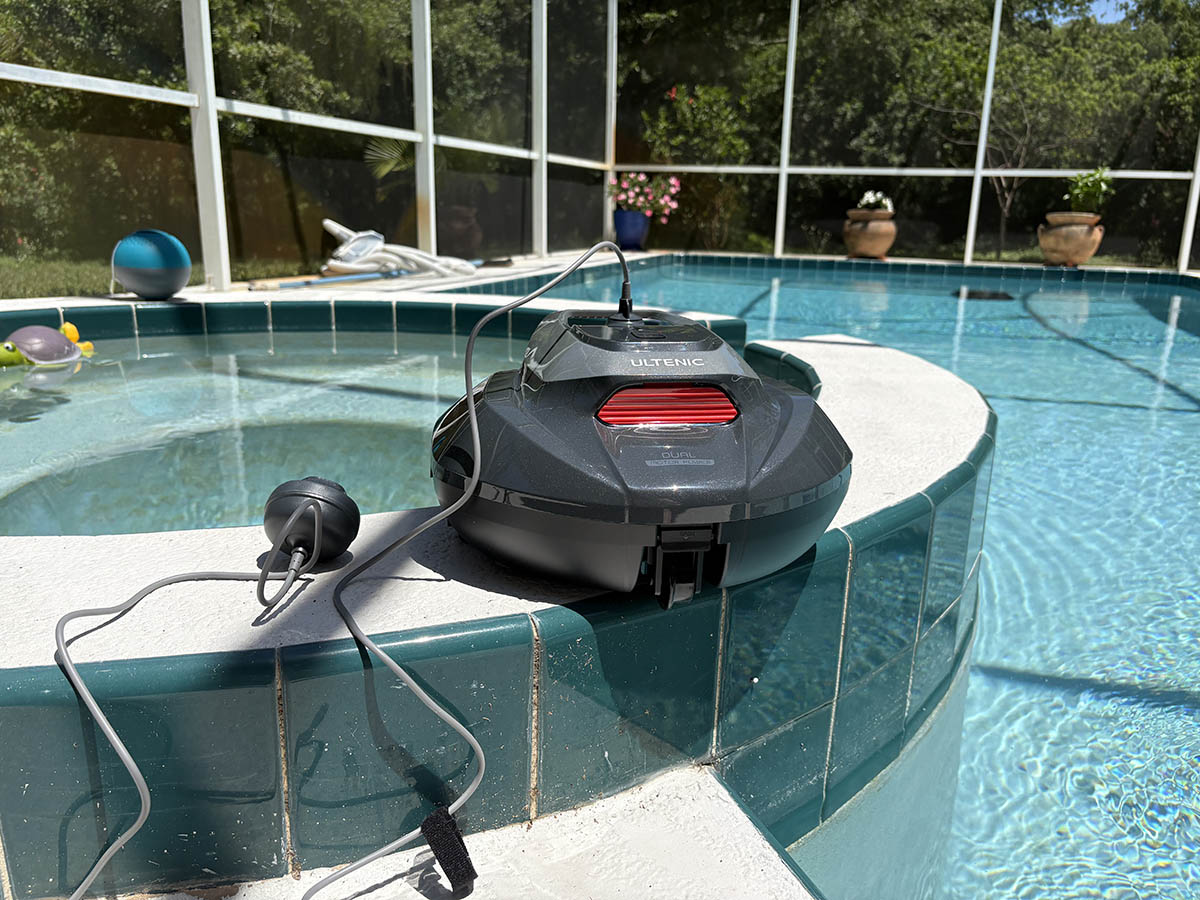
Robotic Pool Cleaners Comparison
| Product | Pool type | Cable length | Cleaning time |
| Dolphin Nautilus CC Plus | Inground | 60 feet | 2 hours |
| Ultenic Pooleco 10 series | Above-ground and inground | Cordless | 90 minutes |
| Dreame Z1 Pro | Above-ground and inground | Cordless | 3 hours |
| Aiper Scuba X1 | Inground | Cordless | 3 hours |
| Beatbot AquaSense 2 | Above-ground and inground | Cordless | Up to 4 hours |
| Dolphin Escape | Above-ground or inground | 40 feet | 90 minutes |
| Polaris 9650iQ Sport | Inground | 70 feet | Customizable |
| Polaris P70 | Above-ground or simple inground pools | 40 feet | 2 hours |
| Betta SE Solar-Powered Smart | Above-ground or inground | Cordless | Continuous |
Our Top Picks
We put these robotic pool cleaners to the test to find the top performers in swimming pool maintenance. Here’s how they stacked up—keep reading for more on how we tested.
Best Overall
Dolphin Nautilus CC Plus Robotic Pool Cleaner
What We Like
- Climbs wall for a thorough cleaning
- Large filtration system for sticks and leaves
- Can be used on all types of pool surfaces
- Users can schedule cleaning ahead of time
What We Don’t Like
- Does not have smartphone capabilities
- May become stuck on steps and require assistance
- Power supply is water-resistant but not waterproof
Specs
- Pool type: Inground
- Cable length: 60 feet
- Cleaning time: 2 hours
Our Ratings: Ease of Use 4.5/5; Performance 4.8/5; Value 5/5
The Dolphin Nautilus CC Plus robotic pool cleaner uses dual scrubbing brushes and a large filtration system to clean and collect leaves, twigs, dirt, pollen, and other debris in just about 2 hours. Schedule the automatic pool cleaner to run every day, every other day, or every third day.
That said, we didn’t want to keep this (or any) robotic pool cleaner in the pool without a caddy to hold the excess cable, as we have dogs to chase around the yard and could easily trip over the cables. Additionally, the power supply is water-resistant, not waterproof. We were interrupted by a thunderstorm halfway through the 2-hour cleaning cycle and didn’t feel comfortable leaving the unit outside to get completely soaked. A cover is available, although it’s sold separately.
On a separate note, the robotic inground pool cleaner has wall-climbing capabilities to clean inground swimming pools up to 50 feet in length. We love how the pool cleaner reverses itself at the top of walls. It actively scrubs with strong suction, sucking up all kinds of debris like a bottom-feeding fish. We also really like that this cleaner can be used on all types of pool floors without issue and has a tangle-free swivel cable to let it freely circulate, which it will do even while swimmers are in the water.
What our tester says: “For my own pool, I prefer the Dolphin Premier robotic pool cleaner. It has three different filters to tackle macro and micro debris, including the stuff I can’t see (like algae), and it cleans my pool with the least amount of effort on my part.”—Jen Karetnick, Product Reviews tester and writer
Read our full review: Dolphin Premier Robotic Pool Cleaner Review
Get the Dolphin Nautilus pool cleaning robot at Amazon or Pool Warehouse.
Best Bang for the Buck
Ultenic Pooleco 10 series Robotic Pool Cleaner
What We Like
- Very simple setup; no app
- Much more budget-friendly than other models
- Emptying is quick and easy
- Easy retrieval with the float
What We Don’t Like
- No smart technology
- Only two small brushes for cleaning
Specs
- Pool type: Above-ground and inground
- Cable length: Cordless
- Cleaning time: 90 minutes
Our Ratings: Ease of Use 5/5; Performance 3.5/5; Value 5/5
The Ultenic Pooleco 10 Series is a no-frills, budget-friendly swimming pool sweeper that surprised us with its speed and simplicity. Setup is as easy as it gets—no app, no Wi-Fi, just charge it up and toss it in the pool. Once it sinks, it immediately kicks into action, zipping across the pool floor faster than any other model we tested. That speed, paired with two small brushes on the underside, seemed to generate enough force to give pool surfaces a solid scrub.
While it doesn’t come with smart features or wall-climbing ability, it nails the basics for a quick and effective clean. The cleaner is designed for pools with straight corners, but we tested it in a pool with curved edges and didn’t notice any issues with coverage. Emptying the debris compartment is fast and easy, and the included float makes retrieval a breeze—no need to fish around in the water.
Those looking for a straightforward, affordable robotic pool cleaner that gets the job done without techy bells and whistles will find that the Pooleco 10 Series is a solid choice. Just keep in mind its limitations: it’s built for flat surfaces only and doesn’t offer advanced cleaning modes. For the price, it delivers impressive speed and ease of use.
Get the Ultenic Pooleco 10 robotic swimming pool vacuum at Amazon or Ultenic.
Upgrade Pick
Dreame Z1 Pro
What We Like
- Remote control comes in handy
- Best waterline cleaning we tested
- Magnetic charging cable
- High-quality build
What We Don’t Like
- No charging stand
Specs
- Pool type: Above-ground and inground
- Cable length: Cordless
- Cleaning time: 3 hours
Our Ratings: Ease of Use 5/5; Performance 4.5/5; Value 5/5
The Dreame Z1 Pro holds its own among the top-tier robotic pool cleaners we tested. Like the other high-end models, it was a breeze to set up—just connect through the app and choose from its five cleaning modes: standard, floor only, wall only, waterline only, or complete. In testing, it navigated smoothly across the pool floor and climbed walls with ease, scrubbing well above the waterline to grab fine debris stuck to the tile edge. That extra reach made a noticeable difference in overall cleanliness.
One standout feature is the built-in remote control. We tested the hands-on controls and had fun manually driving the robot around the pool to spot-clean specific areas. While the Z1 Pro already performs well in automatic mode, the ability to steer it directly to a trouble spot is surprisingly useful when tackling a buildup of leaves or algae.
Another highlight is the magnetic charging cable, which feels like a major upgrade from the usual rubber plug system. It clicks into place easily and eliminates the fuss of aligning ports or dealing with covers. While it doesn’t come with a charging dock, we didn’t miss it, though those who like a tidy storage setup might prefer having one. All in all, the Dreame Z1 Pro is a powerful, user-friendly option with smart features and thoughtful design touches.
Get the Dreame Z1 Pro robotic pool cleaner at Amazon or Dreame.
Best Filtration
Aiper Scuba X1
What We Like
- Fantastic app settings
- Multiple cleaning options
- Best filtration we tested
What We Don’t Like
- Feels slightly flimsier than other top models
Specs
- Pool type: Inground
- Cable length: Cordless
- Cleaning time: 3 hours
Our Ratings: Ease of Use 5/5; Performance 5/5; Value 4/5
At first glance, the Aiper Scuba X1 doesn’t feel quite as rugged as some of the other robotic pool cleaners we tested, like the Dreame or the Beatbot. But once it was in the water, it quickly proved to be a standout performer. Setup was seamless—fast app pairing, intuitive controls, and simple task selection. Users can choose from floor-only, walls-only, waterline, or smart mode cleaning, and in our testing, all modes worked exactly as promised.
What really impressed us was the Scuba X1’s filtration system. Its filter uses a noticeably thicker material than others, and it did an excellent job collecting fine debris and algae. After just an hour, the filter was visibly green from algae buildup—proof it was doing serious work. Cleaning the filter is easy: just pop it out, hose it off, and it’s ready to go again. The waterline mode was especially useful for clearing out stubborn debris clinging just above the water’s surface. We also appreciated the compact charging station that holds the cleaner neatly between uses.
While it may not feel as heavy-duty as some competitors, this cordless pool cleaner delivers where it matters most: smart features, excellent filtration, and effective pool cleaning with minimal hassle.
What our tester says: “I thought the Aiper Scuba X1 was the best robot pool cleaner for my pool. I didn’t even know there was so much algae in there, but when I looked at the filter, it was bright green! Very impressive machine.”—Paul Rankin, Product Reviews tester and writer
Get the Aiper Scuba X1 robotic pool cleaner at Amazon or Aiper.
Best All-in-One
Beatbot AquaSense 2
What We Like
- Good-looking stand for charging
- Very well-constructed (it’s a beast)
- Stellar app support and controls
- Handles all parts of the pool
What We Don’t Like
- Quite heavy to pull out of the water
Specs
- Pool type: Above-ground and inground
- Cable length: Cordless
- Cleaning time: Up to 4 hours
Our Ratings: Ease of Use 5/5; Performance 4.5/5; Value 4.5/5
The Beatbot AquaSense 2 makes pool cleaning refreshingly easy right from the unboxing. Setup is quick—just download the app, connect via Bluetooth and WiFi, and it’s ready to go. Once in the water, it takes a few moments to calibrate before methodically working its way around the pool. It scrubs the floor thoroughly and climbs walls with ease, even reaching a couple of inches above the waterline. That said, it doesn’t quite stretch high enough to catch debris more than 5 inches above the water, so a followup hand wipe may be necessary.
The app is one of the better ones we tested. It’s user-friendly and keeps a detailed log of each cleaning session, including how long the bot spent on the walls versus the floor. For those who like performance data, this feature is a nice bonus. We appreciated the AquaSense 2’s smart, efficient movements and its ability to tackle both flat surfaces and vertical climbs.
While it misses a few inches at the top of the waterline, the Beatbot AquaSense 2 delivers a powerful, low-effort clean with smart features and thoughtful tracking. It’s a solid choice for those who like a bit of tech behind their pool maintenance.
Get the Beatbot AquaSense 2 robotic pool cleaner at Amazon or Beatbot.
Best for Above-Ground
Dolphin Escape Robotic Pool Cleaner
What We Like
- Rapid cleaning cycle
- Convenient remote-start function
- Suitable for all pool surface types, including gunite
What We Don’t Like
- Cannot climb pool walls
- Electrical adapter is not waterproof
- Difficult to remove from pool mid-cycle
Specs
- Pool type: Above-ground or inground
- Cable length: 40 feet
- Cleaning time: 90 minutes
Our Ratings: Ease of Use 4/5; Performance 4.5/5; Value 4.5/5
While many automatic pool vacuums don’t work on above-ground pools, the Dolphin Escape robotic cleaner is designed specifically for them. This robotic pool cleaner can’t climb walls, but it cleans pool floors made from gunite/plaster, vinyl, and fiberglass in pools up to 30 feet in length. The machine has dual scrubbing brushes, and the large-capacity filter traps all sizes of debris during the 90-minute cleaning cycle.
The Dolphin Escape was extremely easy to set up; we had it up and running in less than 5 minutes. To activate the 90-minute cleaning cycle, simply push the button on the power adapter. The button will then light up blue to indicate the vacuum is cleaning. Once the cycle is finished, the vacuum stops and the light turns off. This unit is also corded electrical, which means there’s no waiting for it to recharge.
Keep in mind that the power adapter is not waterproof, so it cannot be submerged or left out in the rain. When testing, we were able to easily set it on our pool filter or pool deck.
The only drawback we found for this unit was the difficulty we had when taking it out of the pool. The vacuum stops after the 90-minute cycle, which means it sometimes stops in the middle of the pool. We had to gently tug on the power cord to pull the unit toward us and then lift it out of the pool. It is quite heavy when it’s full of water, though, so to pull it onto the deck or over the pool wall, we had to allow it to drain first.
Read our full review: Dolphin Escape Robotic Pool Cleaner
Get the Dolphin Escape robotic pool cleaner at Amazon.
Best for Inground
Polaris 9650iQ Sport Robotic Pool Cleaner
What We Like
- Handles walls, stairs, and bench seats with ease
- Wi-Fi and Amazon Alexa compatible
- Comes with a caddy at no extra cost
- Dirty-canister indicator tells users when to empty
- 4-wheel drive improves control and stability
What We Don’t Like
- Premium price tag compared to similar options
- Caddy cover is not included (purchased separately)
Specs
- Pool type: Inground
- Cable length: 70 feet
- Cleaning time: Customizable
Our Ratings: Ease of Use 5/5; Performance 5/5; Value 3/5
The Polaris 9650iQ Sport offers scheduled and timed cleaning. This robotic cleaner is Wi-Fi compatible, allowing users to control and monitor the vacuum through Polaris’ iAquaLink app. Alexa is a better option if swimmers are using the pool at the same time, given that phones tend to overheat and don’t like getting wet.
We liked that we were able to choose how long we wanted the vacuum to operate and which cleaning mode to use. When the pool was dirty and had more debris after a storm, it made sense to have the robot run longer and use the deep-clean cleaning mode. Thanks to its four-wheel drive feature, it’s able to climb over obstacles without getting stuck, which we found to be useful when the kids forgot a large sinking toy in the pool.
It’s a good idea to pay attention to the dirty-canister indicator so that the vacuum can be emptied and cleaned when necessary. Those who have a tree that sheds lots of little leaves, a dog that rolls in the dirt and then jumps in the pool, or kids that track in sandbox residue—as we do—will want to vacuum and dump the filter often.
Get the Polaris 9650iQ robotic pool cleaner at Amazon or The Home Depot.
Best for Smaller Pools
Polaris P70 Robotic Pool Cleaner
What We Like
- Lightweight compared to other models
- Easy-to-clean top-loading debris basket
- Simple to operate
What We Don’t Like
- Doesn’t climb walls
- Doesn’t include caddy or cover
- Debris basket can fill quickly
Specs
- Pool type: Above-ground or simple inground pools
- Cable length: 40 feet
- Cleaning time: 2 hours
Our Ratings: Ease of Use 4.5/5; Performance 4/5; Value 4/5
Smaller pools are fashionable now; pool companies and homeowners alike have figured out how to fit them into foliage-heavy spaces. Despite their size, smaller pools still need to be cleaned regularly to keep them from being overrun with organic debris.
This compact automatic pool cleaner does the trick. Small but effective, the vacuum offers a lot of suction power and great scrubbing action with its single brush. We were impressed by how much material it inhaled into its top-loading basket, which was a breeze to unload and empty. The brand promises that this unit will clean a pool in less than 2 hours. We found that claim to be true, as it cleaned our 28-foot pool in about 90 minutes.
The debris basket features a transparent lid so users can easily see when the basket is ready to be emptied. Removing the basket was extremely simple, and cleaning it took seconds with the hose. We particularly liked how Polaris includes a mesh filter around the entire debris basket, which is helpful in high-allergy seasons when pollen and cottonwood are excessive.
Its 40-foot floating cable provided the unit ample length to navigate our pool without tangling.
Get the Polaris P70 robotic pool cleaner at Amazon or Leslie’s.
Best Robotic Skimmer
Betta SE Solar-Powered Smart Robotic Skimmer
What We Like
- Lightweight robotic skimmer that anyone can use
- Includes a remote control for targeted cleaning
- Easy-to-clean top-loading debris basket
- Solar-powered; no battery or cord needed
What We Don’t Like
- May spill debris if tipped
- Can get stuck in pool filter current
Specs
- Pool type: Above-ground or inground
- Cable length: Cordless
- Cleaning time: Continuous
Our Ratings: Ease of Use 3.5/5; Performance 4.5/5; Value 5/5
Everyone focuses on the dirt and debris that accumulates at the bottom of the pool as well as the slimy algae that can creep up on the walls, but let’s not forget about the never-ending debris that falls onto the top of the water. Skimming a pool the old-fashioned way with a pole and net may work, but it can take forever on a hot day when the only real goal is to get cooled off without being covered with bugs. Betta has solved this ongoing issue with its SE solar-powered smart robotic skimmer.
Since our pool sits in shade for the first half of the day, we were a bit doubtful at first about how well this cordless pool vacuum would work. After one use, though, we were hooked. The solar-powered unit stores enough solar charge to propel the dual motors all day long, even in the shade. When the robot senses shade, it will move to a sunny spot when needed. We were impressed with the amount of debris this simple robot picks up. We leave it in the pool when we’re not swimming, and we have not had to skim once this swimming season.
We found that it moves best with the filter off because it does have a hard time getting away from the natural current that the filter creates. This wasn’t a deal breaker, though, because as the filter runs, the debris stays in the back of the robot. It also features a remote control that lets users direct the robot to specific parts of their pool.
There’s only one real downfall with this unit. When removing it from the pool to empty the filter basket, it’s important to be very careful not to tip it, since the debris will fall out of the back of the unit and back into the pool. All that’s necessary is to simply open the Betta’s top frame and remove the debris basket when it’s full.
Get the Betta SE solar-powered smart robotic skimmer at Amazon.
Jump to Our Top Picks
How We Tested the Best Robotic Pool Cleaners
| Testing Stats | |
|---|---|
| Products tested | 17 |
| Time spent testing | 4 months |
| Price range | $180 to $2,100 |
Rafi Friedman, the CEO of Coastal Luxury Outdoors, a company based in Jacksonville, Florida that specializes in pools and outdoor living areas, reveals the number one feature to prioritize when buying a robot pool cleaner: “the quality of the motor, which is the most important—and most expensive—moving part in a robotic pool cleaner.” He adds, “The key term to look for here is commercial grade. These motors will last longer under harsh conditions and are also more energy efficient.”
With that advice in mind, we researched over 30 robotic pool cleaners and tested 17 top models across multiple above-ground and inground pools using both chlorine and saltwater systems. We evaluated setup time, ease of use, cleaning modes, smart features, battery life, build quality, and how effectively each model handled debris of all sizes. We scored them based on real-world performance, including how well they picked up leaves, dirt, algae, and pet hair after gardening, shedding trees, and backyard swimming with dogs. We also tested wall-climbing ability, filter design and cleanup, retrieval process, and how safe they were to swim around. Bonus points were awarded for intuitive apps, fast charging, and thoughtful design extras like magnetic chargers or storage stands.
| Product | Ease of Use | Performance | Value |
| Dolphin Nautilus CC Plus | 4.5 | 4.8 | 5 |
| Ultenic Pooleco 10 series | 5 | 3.5 | 5 |
| Dreame Z1 Pro | 5 | 4.5 | 5 |
| Aiper Scuba X1 | 5 | 5 | 4 |
| Beatbot AquaSense 2 | 5 | 4.5 | 4.5 |
| Dolphin Escape | 4 | 4.5 | 4.5 |
| Polaris 9650iQ Sport | 5 | 5 | 3 |
| Polaris P70 | 4.5 | 4 | 4 |
| Betta SE Solar-Powered Smart | 3.5 | 4.5 | 5 |
What to Consider When Choosing a Robotic Pool Cleaner
Before choosing a robotic pool vacuum to better maintain your swimming pool, take the time to consider a few parameters to make the right decision easier.
Pool Floor Material
One of the most important points to consider when choosing a robotic pool cleaner is the pool’s floor type and material. If that sounds basic, remember that swimming pool floors can be flat, rocky, irregular, or sloping, and smooth or textured.
After considering the floor type, identify whether the pool is fabricated from fiberglass, vinyl, tile, gunite, or plaster. Not all robotic pool cleaners work with all floor materials. In fact, some robotic cleaners can damage certain types of floors, so it’s important to make sure to choose one rated for the pool floor’s specific material.
Pool Shape
The shape of a pool plays a key role in choosing between robotic pool vacuum options. If the pool is round or rectangular with no irregularities,finding a robotic pool cleaner that scours every inch without fail (with the exception of stairs or bench seats) is easy. Another basic consideration is whether the pool is inground or above-ground. Robotic pool vacuums that can clean the sides of a pool are great for inground pools, but can put too much stress on the wall of above-ground pools.
Many manufacturers pack their cleaners with advanced smart features that use artificial intelligence to learn the layout of a pool so they clean efficiently and quickly. Users who have a custom pool with rising slopes, built-in bars, and sharp angles will want to consider a pool cleaner that has more advanced features; some may include deflecting mechanisms, gyroscopic mobility, and scanning software.
Pool Size
The size of a pool is another major factor to consider when choosing a robotic pool vacuum. Many robotic cleaners come with an extension cord, and length is important. The required extension-cord length for a small 20-foot pool will be much shorter than for a 50-foot pool. Also, the pool size determines the speed at which the robotic pool cleaner will do its job.
A pool cleaner rated for a 30-foot pool can clean that pool in just 2 hours, but try to use the same pool cleaner in a 50-foot pool and the extension cord likely won’t be long enough to complete the job. Even if the cord was long enough, the robotic pool cleaner would take twice as long to complete the cleaning and may not have the storage capacity to hold the collected debris.
Wheels and Treads
Robotic cleaners typically use rear propulsion to drive them through the water, but without the right wheels and treads, this propulsion system is severely limited. Try to find robot pool cleaners that feature wheels capable of gripping the slick pool floor. Wheels with rubber treads are common for above-ground pool vacuums because they move easily across the bottom of the pool, completing cleaning cycles in no time.
For the robotic pool cleaner to tackle the dirt and grime on walls, its wheels should be designed with distinct tread patterns that allow the robotic pool vacuum to retain its position and balance on the side of the pool while propelling itself forward. Consider a robotic cleaner that uses long, tank-style treads because these treads are always in contact with the pool surfaces.
Filtration
Automatic pool cleaners function best if selected based on the type of debris a pool collects. That will depend on the landscape, climate, and geographic location. These all contribute to the type of dirt, sand, pollen, seeds, leaves, flowers, twigs, and bugs that drift into the pool.
For example, if a yard is filled with trees, a robotic pool vacuum with a large filtration basket that doesn’t fill up too quickly is best. If dirt, sand, and pollen are the main types of debris in a yard, robotic cleaners with ultrafine filters that capture dirt from the water are ideal. Remember, the more debris in the pool, the more stress the pool’s filtration system experiences.
Programming, Scheduling, and Accessories
Not all robotic pool cleaners live up to their technological potential, and some require owners to start them manually. Some of the best robotic cleaners allow pool owners to set a daily or weekly cleaning cycle for their operation. The cleaner can either stay in the pool or be removed and put back in time for the scheduled cleaning.
If the cleaner will be stored in the pool during the season, it’s important to consider the power source. Is it waterproof or water-resistant? Does it need to be plugged into an outlet to use, or is it rechargeable? Does the robotic pool vacuum come with a caddy so that the excess cord can be wound up, saving someone from tripping on it, or does that caddy cost extra? These are all important considerations.
Some of the best robotic pool cleaners now have Wi-Fi capability so that owners can pair them with a smartphone, Alexa, computer, or another device. If it feels safer to clean the pool while no one is in it, a robotic cleaner with this technology might be preferable.
The Advantages of Owning a Robotic Pool Cleaner
Regularly cleaning a swimming pool is a must, though it’s a time-consuming and tiring chore. A robotic pool vacuum does the work with minimal or no human participation in about 2 to 3 hours.
We interviewed Clay Spann, the senior vice president of merchandising at Leslie’s, a nationwide company offering pool and spa care products since 1963. Spann says that “robotic cleaners have a unique advantage over suction side or pressure side cleaners because they don’t rely on your pool pump to operate.” He adds, “Using a robotic pool cleaner helps improve the circulation and filtration beyond what your pump and filter can offer on their own.”
Regular cleaning will also prolong the life of a pool because it removes dirt and debris more efficiently than manual cleaning. Plus, an automatic pool cleaner captures debris that would otherwise become trapped in the filtration system. A robotic pool vacuum lessens the need for repairs and relying on a swimming pool cleaning service, saving time and expense. The following points sum up the benefits of robot pool cleaners.
- Robotic pool vacuums remove more dirt and debris from pools than other cleaning methods.
- A simple-to-use automatic pool cleaner will also save money on a professional cleaning service.
- The best robotic pool cleaners save time and energy because most clean pools within 3 hours.
FAQs
Still curious about how robotic pool cleaners work? Consider these frequently asked questions about robot pool cleaners and their answers.
Automatic pool vacuums do pick up leaves, though if the pool collects a lot of leaves, it’s important to invest in a model that has a large filtration basket to prevent the pool cleaner from filling up before it can finish the cleaning cycle.
You can leave the robotic pool vacuum in the swimming pool without experiencing immediate negative consequences, but the extended time it spends underwater will result in the cleaner wearing out faster than it will if removed and cleaned following the completion of its cleaning cycle. In addition, the power packs are not necessarily waterproof. Robotic pool cleaners are water-resistant, although they could get damaged in heavy rains if not stored properly on a caddy with a cover over them. And they could still become damaged during tropical storms or floods.
It is not recommended to use an extension cord with a robotic pool cleaner for safety. It is recommended to plug the pool cleaner into a GFCI outlet.
Robotic pool vacuums can run on a daily basis if the pool is heavily used. If the pool is not used every day, weekly cleanings should be enough to maintain the pool.
Robotic pool vacuums function like robotic floor vacuums. Empty the collection bins, inspect the filters for damage, and clean robotic pool vacuums to keep them working properly. The brushes under the robot and the side brushes need regular cleaning to prevent the automatic pool cleaner from malfunctioning. Keep the cable wrapped around a caddy and the caddy covered to protect the power unit whether it is in use or not.
On average, a robotic pool vacuum will run for about 5 years, though they can last longer if properly maintained and stored.
It’s important to note that not all robotic pool cleaners are capable of the same tasks. Some, for example, can clean walls and stairs while others cannot. Additionally, users with especially large pools may find the cable length of their robot cleaner to be lacking, but this can usually be remedied by purchasing a longer cable. Lastly, users still need to skim floating debris from the surface of the water, despite the great job the robot cleaner is doing on the pool’s surfaces—unless they’ve opted for the robotic pool skimmer we tested, as well!
Robot pool cleaners help alleviate a lot of the physical labor associated with proper pool maintenance. It’s up to the individual user to decide whether the (usually) high up-front cost of purchasing one is worth the savings in both time and energy. Also, consider the potential savings in professional pool maintenance costs.
The power consumption of a regular booster pump used to clean a pool is far greater than a robot pool cleaner (sometimes as much as 10 times more electricity used). A low-voltage robot model can pass along impressive energy savings compared to standard pool-cleaning options.
Meet the Testers
Jen Karetnick is a Miami-based writer and longtime tester of home and garden products, with a practical eye for outdoor gear and pool essentials.
As the executive editor of Product Reviews, Stephanie Cronk has spent years researching and testing products. As a pool owner for over 15 years, she understands the importance of maintaining a clean pool in the warmer months.
Originally from Scotland and now based in Florida, Paul Rankin takes a straightforward, hands-on approach to testing pool gear—focusing on real-world results and usability.
Additional research provided by Timothy Dale.
